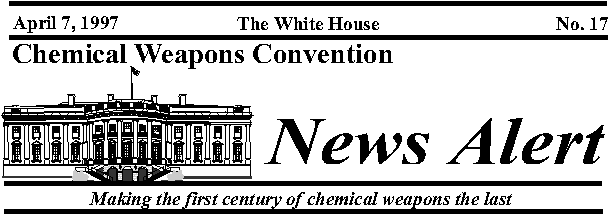President Clinton hosted a broad bipartisan show of support for the Chemical
Weapons Convention, a treaty negotiated under President Reagan and concluded and signed
under President Bush. Treaty supporters who attended the White House event include former
JCS Chairmen Generals Colin Powell and David Jones as well as representatives from the VFW,
the Reserve Officers Association and Gulf War, Vietnam and Korean War veterans groups. Other
attendees include former Senator Warren Rudman, and Reagan Administration officials Paul
Nitze, Edward Rowny and Ken Adelman.
Addressing the White House gathering were:
Vice President Gore:
�[This group represents] men and women in different political parties, different points
on the ideological spectrum ... [there have been] dozens of important issues that have faced
America where these individuals have argued with one another and been on different sides,
passionately. But on this issue, every single one of them is in agreement because ... these
individuals have concluded this is very definitely in the best interest of the United States
of America. The time has come to ratify the Chemical Weapons Convention.�
Secretary of State Madeleine Albright:
�The time for Senate action is now. The treaty has been pending in the Senate for 180
weeks. It�s been the subject of more than a dozen hearings and scores of briefings. And
we have supplied more than 1,500 pages of testimony, reports, correspondence and answers
for the record concerning it. In summary, this treaty is a test of our ability to follow
through on commitments.�
Secretary of Defense William Cohen:
�Quite simply, this treaty is critical to the safety of our soldiers, sailors, airmen
and Marines. The Chemical Weapons Convention is needed to protect and defend the men and
women in uniform who protect and defend our country.�
Former Secretary of State James Baker:
�...the Chemical Weapons Convention was negotiated under Presidents Ronald Reagan and
George Bush. The argument that some have used against ratification of the CWC is that it
would somehow undermine our national security. Frankly, the suggestion that George Bush
and Ronald Reagan would negotiate a treaty detrimental to this nation�s security is
outrageous.
�Ratification of the CWC is at its core really a test of American leadership ... if we
fail to ratify, we will ... isolate ourselves from our friends in the international arena,
|
and ... throw in our lot with
the rogue states which oppose this treaty. But most importantly of all, my friends,
if we fail to ratify the CWC, we will be sending a clear signal of retreat from
international leadership, both to our allies and to our enemies alike. This is a message
we should never, never send. Instead, we should send another message; we should send a
message that the United States of America is a nation aware of our international
responsibilities and a nation confident enough to assume them. In a word, we should
send a message that America is prepared to continue to lead.�
Former Senator Nancy Kassebaum Baker:
�As a former member of the Senate Foreign Relations Committee for 16 years who
strongly supported President Reagan�s efforts to negotiate this treaty, President
Bush�s efforts to complete it, and President Clinton�s efforts to ratify it, I can
attest to the strong bipartisan support for this convention over the years.�
Former Senator David Boren:
�During the six years that I chaired the U.S. Senate Intelligence Committee, time
and time again our intelligence experts came before our committee to warn us that the
greatest threat to our national security and to the next generation is the spread of
weapons of mass destruction, including chemical weapons. ... The decision we must soon
make about the ratification of the Chemical Weapons Convention is one of those
decisions on which history will judge us, and I am proud to stand with those gathered
today to urge its ratification.�
President Clinton:
�Presidents and legislators from both parties, military leaders and arms control
experts have bound together in common cause because this is simpy good for the future
of every American. ... Ratifying the Chemical Weapons Convention ... says America is
committed to protecting our troops, to fighting terror, to stopping the spread of weapons
of mass destruction, to setting and enforcing standards for international behavior, and
to leading the world in meeting the challenges of the 21st century. I urge the Senate
to act in the highest traditions of bipartisanship and in the deepest of our national
interests.
�...the words that I have spoken today are nothing compared to the presence, to the
careers, to the experience, to the judgment, to the patriotism of Republicans and Democrats
alike and the military leaders who have gathered here and who all across this country have
lent their support to this monumentally important effort.�
|


